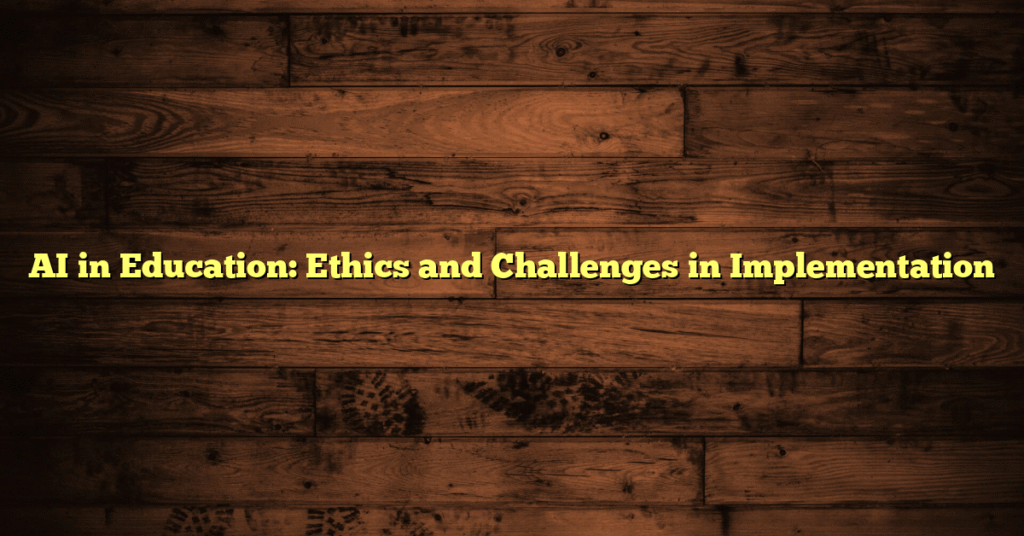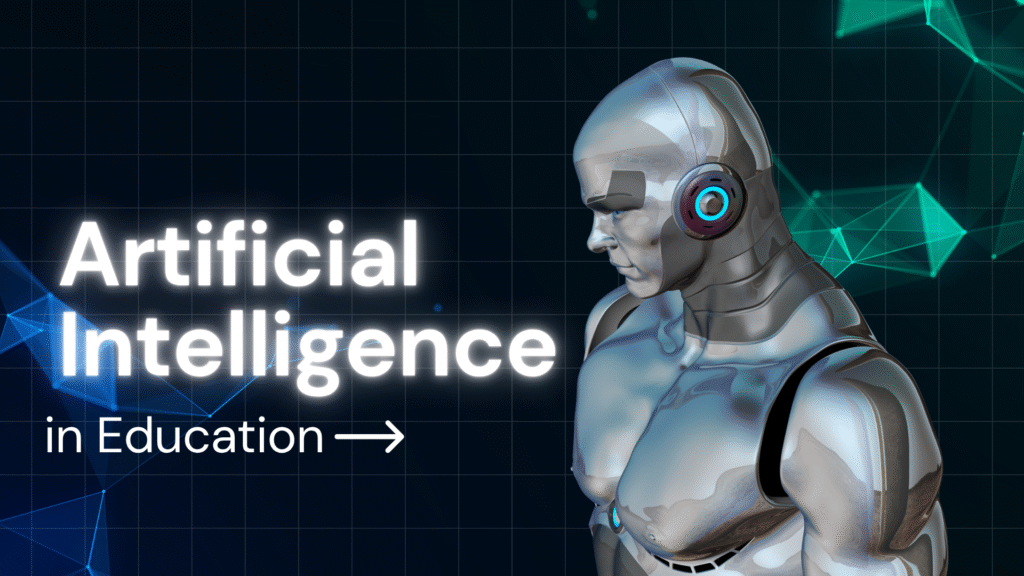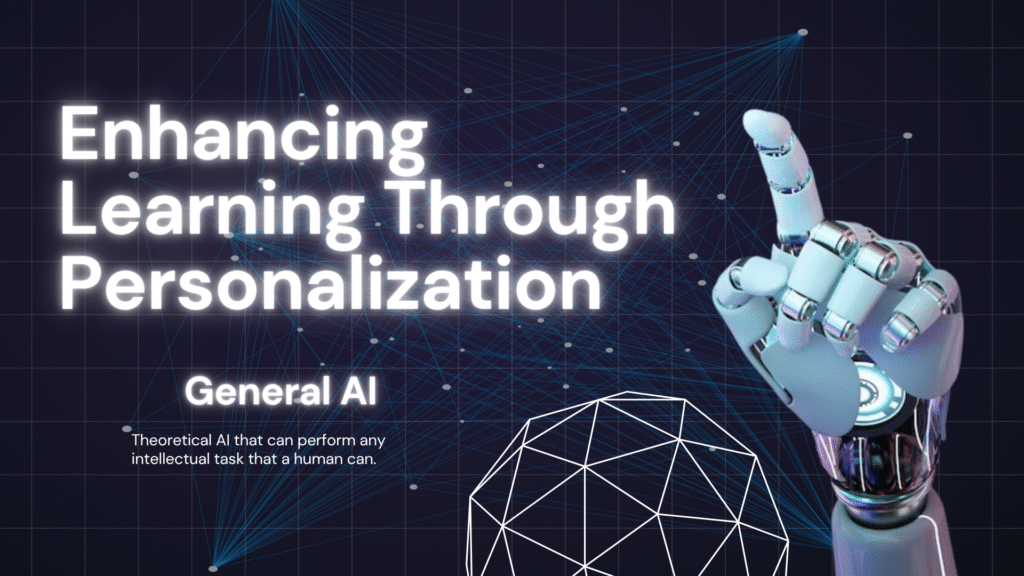As we dive into the twenty first century, know-how has grow to be an integral a part of our each day lives, reshaping how we be taught, educate, and work together. Some of the vital improvements on this house is synthetic intelligence (AI). Whereas AI in schooling guarantees to enhance personalised studying experiences and streamline administrative duties, it additionally brings forth a plethora of moral challenges that educators and policymakers should navigate. On this article, we’ll discover these moral dilemmas and implementation challenges surrounding AI in schooling, offering insights that may assist educators make knowledgeable selections.
The Rise of AI in Training
In recent times, the mixing of AI in schooling has skyrocketed. From clever tutoring methods to automated grading and personalised studying platforms, AI is more and more taking heart stage. Nevertheless, this know-how’s speedy progress raises questions on its implications for college kids, academics, and the schooling system as an entire.
AI in schooling can present personalised pathways for learners. As an example, platforms like Google Classroom use AI algorithms to evaluate college students’ strengths and weaknesses, tailoring classes to suit their wants. These personalised studying experiences goal to reinforce scholar engagement and retention, making studying more practical.
Nevertheless, whereas the advantages of AI are palpable, we should additionally confront the moral concerns linked to its use. Let’s dive into these moral issues.
Moral Concerns in AI Implementation
Information Privateness
Some of the urgent moral issues surrounding AI in schooling is knowledge privateness. AI methods typically depend on huge quantities of knowledge to operate successfully. This consists of private details about college students, akin to their tutorial efficiency, conduct patterns, and preferences. When establishments gather and use this knowledge, how can they assure that it stays safe?
As an example, incidents of knowledge breaches should not unusual. A single compromised database can result in the unauthorized entry of delicate data. Colleges should tread rigorously, making certain compliance with knowledge safety laws just like the Household Instructional Rights and Privateness Act (FERPA) in the USA, which safeguards scholar data.
Bias and Fairness
One other vital problem is the potential for bias inside AI algorithms. Machine studying fashions be taught from knowledge, but when that knowledge accommodates historic biases, the AI will probably replicate and even amplify them. For instance, if a tutoring system is skilled on a dataset that underrepresents marginalized teams, it’d ship much less efficient academic suggestions for these college students.
The implications of biased AI can perpetuate academic inequities, widening the gaps between completely different socioeconomic teams. Educators and builders must be vigilant and guarantee various datasets are used and that the AI methods bear thorough moral opinions.
Autonomy and Dependence
As colleges implement extra AI applied sciences, there’s the chance college students may grow to be overly depending on these instruments. Whereas AI can assist college students be taught successfully, it might probably additionally undermine their vital considering and problem-solving expertise. When college students depend on AI to search out solutions reasonably than partaking within the studying course of, they may miss out on necessary cognitive improvement alternatives.
Encouraging autonomy whereas nonetheless offering the advantages of AI is a difficult balancing act for educators. It’s important to combine AI into the curriculum meaningfully and guarantee it enhances conventional instructing strategies reasonably than changing them.
The Problem of Implementation
Infrastructure and Entry
Whereas AI presents transformative potential, implementing these applied sciences isn’t with out its challenges. One of many major obstacles is infrastructure. Many faculties, particularly these in low-income areas, lack the technological assets required to implement AI successfully. This digital divide can result in vital disparities in academic alternatives.
Investments in infrastructure are important to make sure equitable entry to AI-driven academic instruments. Policymakers must prioritize funding for colleges that lack the monetary means to undertake these applied sciences, making certain that each one college students have equitable entry to AI-enhanced studying assets.
Coaching and Assist for Educators
One other implementation problem lies in instructor coaching. Educators have to be well-equipped to profit from AI instruments, however many lack the required coaching and assist. If academics are uncertain tips on how to combine AI applied sciences successfully into their instructing practices, the potential of those instruments might go untapped.
Skilled improvement packages that target AI literacy for educators are essential. Coaching academics to grasp the ethics surrounding AI utilization and tips on how to leverage these applied sciences could make a big distinction of their integration.
Balancing Innovation and Custom
Lastly, as colleges push the envelope of innovation with AI in schooling, they have to additionally respect the worth of conventional instructing strategies. Putting a steadiness between modern practices and confirmed academic methods is a crucial consideration that shouldn’t be missed. A blended strategy that mixes one of the best of each worlds can typically yield one of the best outcomes.
Transferring Ahead with Objective
Whereas the mixing of AI in schooling comes with a myriad of moral issues and implementation challenges, it additionally holds immense potential to reshape how we educate and be taught. Nevertheless, navigating these complexities requires a considerate strategy.
-
- Prioritize Information Safety: Educators and directors should prioritize the safety of scholar knowledge. By implementing stringent knowledge safety measures and recurrently auditing safety practices, colleges can construct belief with college students and oldsters.
-
- Incorporate Various Views: When creating AI methods, it’s important to incorporate quite a lot of voices within the knowledge assortment and algorithm design processes. This range can assist mitigate bias and be sure that all college students profit from AI applied sciences.
-
- Foster Digital Literacy: Equipping academics with the required instruments to grasp and successfully use AI is essential. Ongoing skilled improvement packages can foster a tradition of digital literacy and confidence amongst educators.
-
- Embrace a Holistic Instructional Method: Colleges ought to try for a blended studying ecosystem that harnesses AI advantages whereas nonetheless honoring conventional pedagogies. A various academic panorama can cater to various scholar wants and studying types.
-
- Interact with Policymakers: Advocacy for insurance policies that assist equitable entry to know-how ought to be a precedence. By partaking with policymakers, educators can assist form the panorama of AI in schooling and be sure that all college students have the assets they should succeed.
Conclusion
As we navigate the potential of AI in schooling, it’s vital to strategy this highly effective device with moral concerns in thoughts. The challenges of implementation, knowledge privateness, bias, dependency, and the necessity for infrastructure and coaching loom massive. Nevertheless, addressing these challenges head-on won’t solely improve the academic expertise for college kids but additionally put together them for a world more and more outlined by know-how. Embracing AI with intention, transparency, and ethics can result in a brighter future in schooling — one the place each scholar has the chance to thrive.



